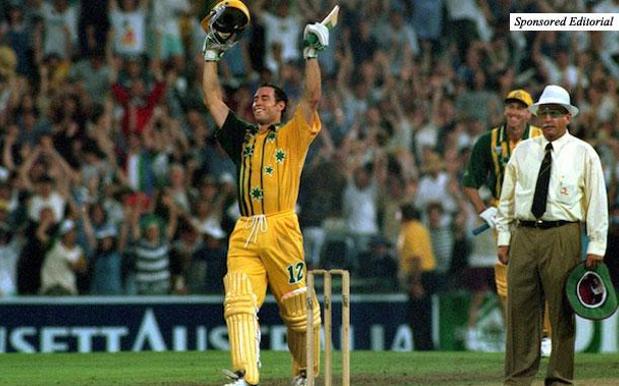
Let’s get loud sports fans! For this edition of our weekly Ray-Ban Legendary Lists we are giving a cheer for the greatest Australian sporting comebacks of all time. Be it through dogged determination, clever tactics, or sheer dumb luck, the following are classic get out of jail free moments that even the most die-hard fans did not expect. So stretch up, get the tiger balm out, and let’s get physical!
1997 ARL Grand Final – Newcastle Knights vs Manly Sea Eagles
It’s not as though Newcastle had to claw back an enormous amount of points but the Novocastrians were distinct underdogs prior to the match and were never in front until the last minute in one of the greatest grandstand finishes of all time. After being belted by the Minor Premiers two weeks prior, Newcastle also had to contend with their play-maker and future Immortal Andrew Johns carrying three broken ribs and a punctured lung into the match. Newcastle started well but Manly scored first through John Hopoate (yes that guy). Going into half time with a 16-8 lead, Manly had dominated much of the first half and took this form deep into the second. With ten minutes to go Newcastle lifted. On the attack and jacked up on painkillers (and lord knows what else after the game) Johnsy stood in a tackle and offloaded to Robbie O’Davis who danced over the line. Johns converted and scores were locked with 5 minutes to go. A frantic few minutes followed with little in the the way of chances. With the seconds ticking down, it was field goal time for Newcastle. But Johnsy balked and ran. He skirted down the sideline, drew the winger and sent Darren Albert through the gap. Newcastle had won their maiden grand final with seconds remaining on the clock.
1983 Americas Cup
The moment was good enough for Prime Minister Bob Hawke to call for an on-the-spot public-holiday (if only more parliamentary decisions were made after 8 schooners), but an often overlooked fact was how far from behind Australia 2 had to come to claim one of our most celebrated national victories. Behind 3-1 in the in the best of 7 race series, morale on Australia 2 was at rock bottom when the US challenger Liberty won the fourth race by a commanding 43 second margin. Liberty only needed one more victory to take the Cup. It doesn’t get any more backs to the wall but the crew of Australia 2 dug deep storming home to take out the next three races in a row and New York Yacht Club had lost the Cup for the first time in 132 years. I’m sailing here!
1996 Australia vs West Indies
Back before Mr Cricket was Mr Cricket and the West Indies were still a dominant world force, Michael Bevan was our go to finisher. The match that established this role was Australia’s ‘great escape’ on New Year’s Day 1996 at the SCG. With many fans nursing heavy heads (and possibly some of his teammates – I’m looking at you Tubby) Bevan was charged with the sole responsibility of orchestrating an unlikely victory after the Aussies slumped to 6/38 chasing the relatively meager 173 target. With a rampaging Curtly Ambrose sending down bone breaking thunderbolts, further capitulation appeared imminent but over the next 2 and a half hours, Bevan, with the assistance of stubborn digs from Ian Healy and Paul Reiffel, had whittled away the West Indies lead. In a tense last over, Glenn McGrath finally got off strike leaving Bevan with the task of needing 4 runs from two balls. The first ball went strait back to the bowler. Bevan attempted the same shot on the second, this time clearing the bowler and sending the ball down the ground for four and the Australians partied like it was 1995.
1970 VFL Grand Final Collingwood vs Carlton
Part of the attraction of Aussie Rules is how the game can ebb and flow but when Carlton trailed Collingwood by 44 points at half time in the 1970 VFL Grand Final, even the most ardent Blues fan could see the writing on the wall. Collingwood had already defeated the Blues three times during the season and there was little to suggest Carlton had anything in their bag of tricks to challenge the dominant Pies. Carlton emerged from the long break with a brand new game-plan devised by coach Ron Barassi. Aiming to shut down Collingwood’s superior long kicking game, the Blues were instructed to favour the handball and play-on at all times. They blitzed the third quarter, scoring 7 goals to 1, eventually defeating the favorites by ten points in what is considered the one of the greatest Grand Finals of all time and heralded as the “birth of modern football“.
2006 FIFA World Cup – Australia vs Japan
Just the mere presence of the Socceroos at the 2006 World Cup was victory enough for many Aussie football supporters but that joy was short lived after Japan’s contentious 26th minute Shunsuke Nakamura goal. Replays suggested that Aussie keeper Mark Schwarzer had been impeded but Japan were up 1-0. If contending with a Group of death containing Croatia and Brazil wasn’t enough, copping bad calls was enough to point to an early exit. Enter super-sub Tim Cahill. Coming onto the pitch in the 53rd minute, Cahill made an immediate impact, invigorating the Socceroos attack but it wasn’t until the 84th minute that Cahill poked one through to the back of the net for the equaliser. What a relief, we’ll take the draw! Or so we thought. With a minute remaining in regular time, Cahill shot a rocket through from the edge of the box only to be topped off with a John Aloisi goal 3 minutes later. The unlikely win kick started a memorable campaign for the biggest surprise packets of the Cup, which came to an end in controversial circumstances against eventual Cup victors Italy.
2000 Bledisloe Cup – Wallabies vs All Blacks
Believe it or not, it wasn’t that long ago that the Wallabies had the wood on the All Blacks. And the Springboks and everyone else in world rugby. Fresh from claiming the 1999 World Cup, the Wallabies had big plans for 2000. Unfortunately the spurned All Blacks had a different idea with reclaiming the Bledisloe at the top of the agenda. Having won a thrilling match in Sydney, the All Blacks had all but achieved Bledisloe glory leading 23-21 at the end of regular time in Wellington. Australia had the ball and continued to roll forward and eventually earned the penalty. It was a tough kick-able shot from near the sideline and Wallaby captain John Eales pointed for the posts unaware that regular kicker Stirling Mortlock was off the field. A noted kicker himself, the kick was left to Eales who lobbed it over with little fuss. Australia retained the Bledisloe for the 3rd year in a row and won in South Africa the next week to claim their first Tri Nations trophy.
1986 Davis Cup – Australia vs Sweden
This would have been more appropriately labelled Pat Cash vs Sweden. Unfortunately for the Aussies, Cash’s teammate Paul McNamee was merely making up the numbers and as expected, lost his two matches against the highly favoured Stefan Edberg and Mikael Pernfors. Cash started his campaign solidly beating Edberg in his first match and Cash and John Fitzgerald then took the doubles on day two, beating Edberd and Anders Jarryd in four sets. Victory over Pernfors, a grass court novice, would clinch the Cup, but Pernfors took it to Cash from the outset taking the first two sets 6-2 6-4. Cash was no push over. Despite the taxing workload of the previous couple of days’ play, the great mullet-ed one fought back taking the next three sets 6-3 6-4 6-3 to claim a memorable Davis Cup title.
2002 Winter Games 1000m Speed Skating Final – Steven Bradbury
Unfairly used as a sporting punchline rather than celebrated as a champion like the other entries on the list, Steven Bradbury earns his place on the the list because we can’t think of a better definition of a sporting comeback. Sure he had his share of luck, but that’s sport. After racing solidly through to the semi finals, Bradbury conceded that the requirements exceeded his physical ability so the wily old fox was happy to sit at the back of the pack and let the other guys jostle for position. It worked in the semi with the leaders crashing out so he applied the same tactics for the final. Maybe it wasn’t pretty but a win is a win and Bradbury’s brains over brawn approach earned Australia 1 of their 2 golds for the game.
1989 WBC Light Heavyweight Title – Jeff Harding
In his first fight on foreign soil, Jeff Harding entered his bout against England’s Dennis Andries as a nobody, to US audiences at least. Harding was tough and took plenty of punishment from the defending title holder and towards the final rounds, Harding’s face resembled a bowl of mince. The referee had threatened to end the fight on account of Harding’s extreme facial bleeding, but legendary trainer Johnny Lewis managed to stem the blood flow enough for Harding to battle through to the last round. Behind on points, it was knock-out or bust for Harding, who dug deep and overwhelmed the West Indian-born Andries knocking him down three times before the fight was called.
1996 Summer 1500 Swimming Final Olympics – Kieren Perkins
Kieren Perkins entered the Atlanta games in terrible form. Having failed to even qualify for the 400m, the defending 1500m champ was ranked below fierce rival Daniel Kowalski. His form seemed to be declining further as he struggled through the qualifying rounds, snatching the last position in the final by a quarter of a second. Perkins was past it. The final was to be a race between Kowalski and English distance swimmer Graeme Smith. But on the biggest stage in world swimming, Perkins defied form and expectation leading out from the first 100m. It was considered a brave but foolish move, surely they’d reel him in but he was never challenged. Perkins went on to win by over 6 seconds and cemented his place in Australian Olympic folklore.
Picture by Getty Images








